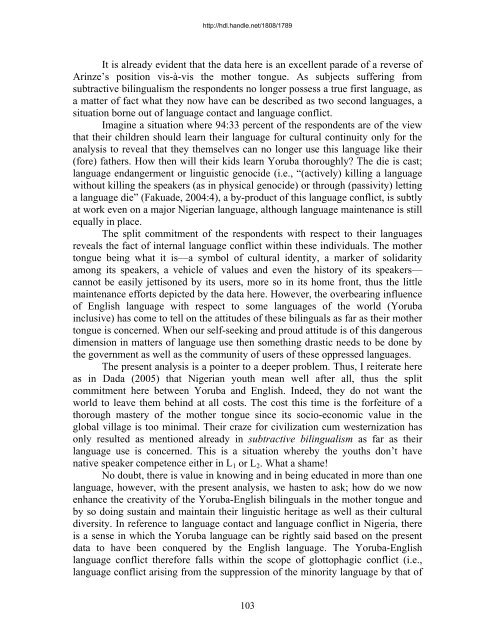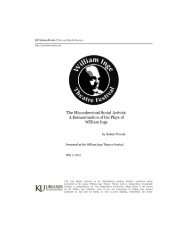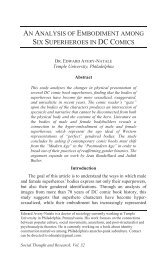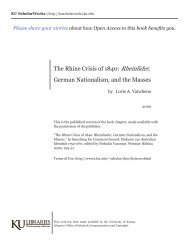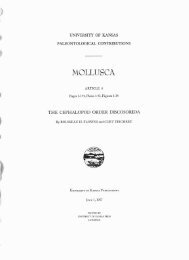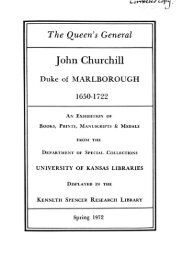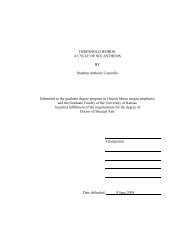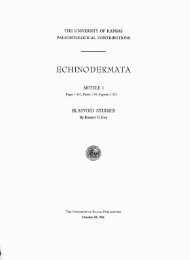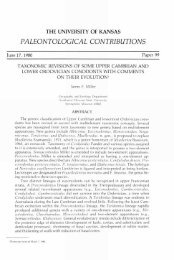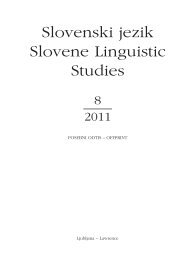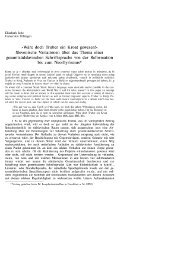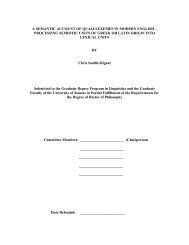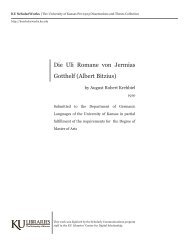LANGUAGE CONTACT AND LANGUAGE ... - KU ScholarWorks
LANGUAGE CONTACT AND LANGUAGE ... - KU ScholarWorks
LANGUAGE CONTACT AND LANGUAGE ... - KU ScholarWorks
You also want an ePaper? Increase the reach of your titles
YUMPU automatically turns print PDFs into web optimized ePapers that Google loves.
http://hdl.handle.net/1808/1789<br />
It is already evident that the data here is an excellent parade of a reverse of<br />
Arinze’s position vis-à-vis the mother tongue. As subjects suffering from<br />
subtractive bilingualism the respondents no longer possess a true first language, as<br />
a matter of fact what they now have can be described as two second languages, a<br />
situation borne out of language contact and language conflict.<br />
Imagine a situation where 94:33 percent of the respondents are of the view<br />
that their children should learn their language for cultural continuity only for the<br />
analysis to reveal that they themselves can no longer use this language like their<br />
(fore) fathers. How then will their kids learn Yoruba thoroughly? The die is cast;<br />
language endangerment or linguistic genocide (i.e., “(actively) killing a language<br />
without killing the speakers (as in physical genocide) or through (passivity) letting<br />
a language die” (Fakuade, 2004:4), a by-product of this language conflict, is subtly<br />
at work even on a major Nigerian language, although language maintenance is still<br />
equally in place.<br />
The split commitment of the respondents with respect to their languages<br />
reveals the fact of internal language conflict within these individuals. The mother<br />
tongue being what it is—a symbol of cultural identity, a marker of solidarity<br />
among its speakers, a vehicle of values and even the history of its speakers—<br />
cannot be easily jettisoned by its users, more so in its home front, thus the little<br />
maintenance efforts depicted by the data here. However, the overbearing influence<br />
of English language with respect to some languages of the world (Yoruba<br />
inclusive) has come to tell on the attitudes of these bilinguals as far as their mother<br />
tongue is concerned. When our self-seeking and proud attitude is of this dangerous<br />
dimension in matters of language use then something drastic needs to be done by<br />
the government as well as the community of users of these oppressed languages.<br />
The present analysis is a pointer to a deeper problem. Thus, I reiterate here<br />
as in Dada (2005) that Nigerian youth mean well after all, thus the split<br />
commitment here between Yoruba and English. Indeed, they do not want the<br />
world to leave them behind at all costs. The cost this time is the forfeiture of a<br />
thorough mastery of the mother tongue since its socio-economic value in the<br />
global village is too minimal. Their craze for civilization cum westernization has<br />
only resulted as mentioned already in subtractive bilingualism as far as their<br />
language use is concerned. This is a situation whereby the youths don’t have<br />
native speaker competence either in L 1 or L 2 . What a shame!<br />
No doubt, there is value in knowing and in being educated in more than one<br />
language, however, with the present analysis, we hasten to ask; how do we now<br />
enhance the creativity of the Yoruba-English bilinguals in the mother tongue and<br />
by so doing sustain and maintain their linguistic heritage as well as their cultural<br />
diversity. In reference to language contact and language conflict in Nigeria, there<br />
is a sense in which the Yoruba language can be rightly said based on the present<br />
data to have been conquered by the English language. The Yoruba-English<br />
language conflict therefore falls within the scope of glottophagic conflict (i.e.,<br />
language conflict arising from the suppression of the minority language by that of<br />
103


